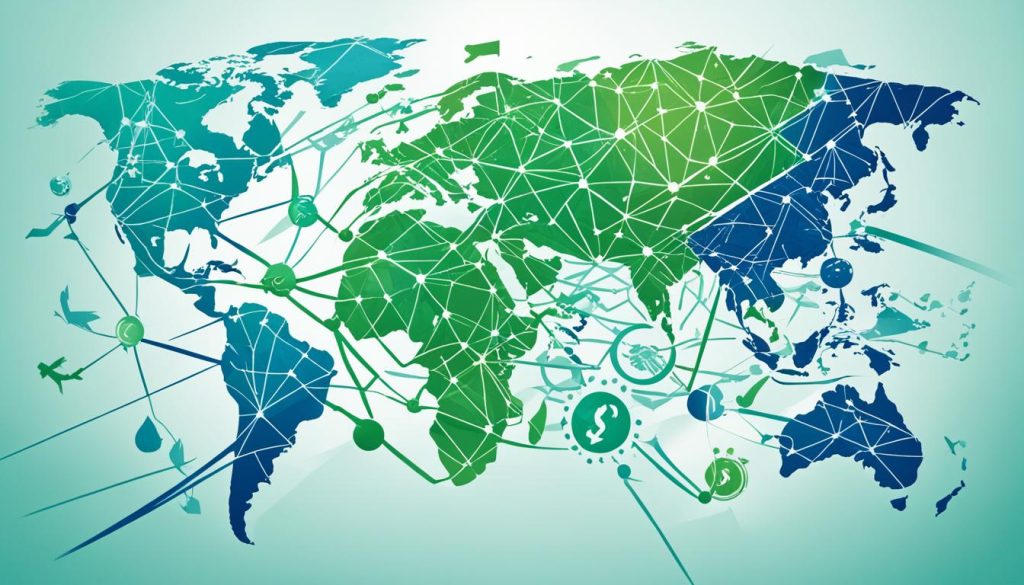International arbitrage gives investors and traders a chance to make money from price differences worldwide. By buying and selling assets in different countries, they can gain significant returns. So, why is international arbitrage so appealing in finance and trade?
International arbitrage is key for market efficiency. It helps align prices around the world by taking advantage of differences. Through currencies, commodities, or stocks, it involves billions in trades each year. Experts highlight how careful planning can lead to big profits.
Case studies show how effective arbitrage strategies are. Some hedge funds have seen great returns by acting on small price differences. International arbitrage doesn’t just offer profits—it also helps keep markets fair and efficient.
Key Takeaways
- International arbitrage exploits price discrepancies across global markets.
- It is essential for maintaining market efficiency and stability.
- Arbitrage opportunities can arise in various assets, including currencies, commodities, and stocks.
- Substantial profits are possible with careful and strategic planning.
- Case studies illustrate the profound impact and potential of successful arbitrage strategies.
Understanding International Arbitrage
International arbitrage makes money from different prices for the same or similar things in various places around the world. By understanding how it works and how it has changed, traders can use these chances well in the world economy.
Definition of International Arbitrage
The term “arbitrage” means buying and selling something at the same time in different places to take advantage of price differences. The arbitrage definition focuses on making money without risk. Traders use price differences that soon disappear as markets change. Knowing this is key in today’s finance world. It shows why international arbitrage is attractive in global markets.
Historical Perspective
Arbitrage has a long trading history. It goes back to ancient currency exchanges and trading. Historical records show traders taking advantage of price differences in different locations. This played a big part in starting early stock markets. These early examples show how important arbitrage was in making markets work better.
Modern Significance
Now, international arbitrage is a big deal in modern finance. New trading tools and technology have changed how arbitrage works. They allow quick trades all over the world. This shows how important arbitrage is in today’s global economy. Quick data sharing and automated trading offer many chances for arbitrage.
Cross-Border Arbitrage: Opportunities and Challenges
Cross-border arbitrage is an exciting field. Traders look for price differences between markets in different countries. To succeed, they must understand international trade barriers and market challenges deeply.
Identifying Arbitrage Opportunities
Finding profitable cross-border arbitrage chances requires careful market study. Traders watch price changes between countries. They look for differences caused by supply and demand, currency rates, and different laws. Advanced trading tools help spot these quick chances.
Analyzing past data and trends improves prediction accuracy. This helps traders make fast, smart decisions. For instance, big chances often come in markets with different economic or political situations.
Common Challenges in Cross-Border Arbitrage
Cross-border arbitrage has its temptations but also challenges. Legal and rule differences matter a lot. Different tax rules, and import/export limits, can make trading hard. For example, various duties and tariffs can lower profit from arbitrage.
Moving goods across borders also has its issues. It calls for strong supply chain management. Plus, currency changes can affect profit. Traders must hedge to reduce these risks and keep stable financially.
Here are the main hurdles in cross-border arbitrage:
- Legal and regulatory barriers
- Taxation issues
- Logistical difficulties
- Currency exchange fluctuations
Understanding and tackling these challenges helps traders profit from international arbitrage. With smart planning and action, cross-border arbitrage can be quite rewarding despite its complexities.
Global Trade Opportunities Through Arbitrage
Global trade has grown a lot. This growth changed how traders use arbitrage to make money from different market prices. It’s important to understand global trade’s impact for those wanting to use these strategies well.
Economic Impact of Global Trade
Global trade greatly affects both small and large markets. Things like trade agreements, tariffs, and world events change arbitrage chances. By looking at these factors, traders can guess market moves and use them to their advantage.
Using smart arbitrage strategies can lower risks from quick economic changes.
Leveraging Global Trade for Arbitrage
To win at trade arbitrage, it’s key to get how global trade rules and policies work. Knowing about tariffs and worldwide economics helps in creating profit-making plans. Using global trade opens up new arbitrage chances.
Reading up on the global economy and talking to financial experts can give traders an advantage.
Arbitrage Strategies for Maximizing Profits
To get the best profits, traders use different arbitrage strategies. They focus on assessing risks and managing them. They look at market conditions and use price differences to improve their methods. This way, they can make significant profits.
Many arbitrage strategies exist that help make big profits while keeping risks low. Statistical arbitrage and merge arbitrage are top choices in today’s markets.
- Statistical Arbitrage: Uses stats and math to find price gaps and benefit from them. Traders use mathematical models to predict market changes and make profits from these predictions.
- Merge Arbitrage: Useful in mergers, it involves buying shares of the company being acquired and selling shares of the acquiring company’s shares short. The goal is to use price differences for a profit without much risk.
Having strong risk management rules is key for these arbitrage strategies to work well with financial goals. Diversifying, sizing positions correctly, and always watching the market helps reduce the impact of sudden market changes.
| Strategy | Key Features | Risk Management Techniques |
|---|---|---|
| Statistical Arbitrage | Uses statistical models, focuses on mean reversion | Diversification, time-weighted positions |
| Merge Arbitrage | Capitalizes on M&A activities, exploits share price discrepancies | Event-driven hedging, position sizing |
Factors Influencing International Market Price Differences
Knowing what drives international market prices is key to finding good deals. Factors like currency exchange rates, economic rules, and how much people want a product all play a big part. These things together cause price differences between countries.
Currency Exchange Rates
Currency fluctuations greatly affect international market prices. A change in exchange rates can make items cheaper or more expensive in different countries. Smart traders use these changes to buy cheap in one place and sell for more in another.
Economic Policies
A nation’s economic policy shapes its market prices. Things like tariffs and import limits can change costs and who competes. For example, high tariffs on imports can make foreign goods more expensive. This situation creates chances for traders to find ways around these rules to save money.
Supply and Demand Dynamics
The classic play of supply and demand also leads to different prices around the world. If a product is in high demand but short supply in one area, its price goes up. If there’s too much of it, the price drops. Traders watch these trends carefully to know the best time and place to make a move.
| Factor | Impact on Prices | Arbitrage Opportunity |
|---|---|---|
| Currency Fluctuations | Price variations due to exchange rate changes | Buying in low-rate currencies, selling in high-rate currencies |
| Economic Policies | Tariffs and taxes influencing cost structures | Utilizing differential policies to gain price advantages |
| Supply-Demand Dynamics | Price adjustments based on market supply and demand | Trading based on regional supply overages and shortages |
Technological Tools and Platforms in International Arbitrage
New technology has changed how traders work in global markets. Today, trading platforms use advanced software and algorithms. These tools allow for quick data access and fast transactions.
Fintech innovations have opened up new chances in international arbitrage. Fintech startups are introducing new arbitration technologies. They offer tools for predictive analytics and fast trading. This makes it easier for traders to find and use market inefficiencies.
Modern trading platforms connect easily with global markets. This connection helps find arbitrage opportunities around the world. Using machine learning and AI improves predicting and decision-making.
| Technology | Functionality | Impact on Arbitrage |
|---|---|---|
| Algorithmic Trading | Automates trading processes | Increases transaction speed and accuracy |
| Predictive Analytics | Analyzes market trends | Enhances decision-making with data-driven insights |
| Machine Learning | Learn from data patterns | Improves prediction of market movements |
With these technologies, traders can better understand global markets. As fintech grows, so does the chance to make more in arbitration. These advancements bring traders closer to success.
Conclusion
Exploring international arbitrage shows its key role in using global markets wisely. We’ve seen how traders use price differences between countries. We looked at the economic reasons for these chances and the high-tech tools that help.
Trading worldwide needs a good grasp of many things. These include how money values change, what governments do, and how much people want things. Using new financial tech, like automatic trading and smart platforms, helps traders stay ahead. This makes sure markets work well and helps traders make more money.
The world of international arbitrage will keep changing. Traders who keep up with new trends and improve their methods will do well. Thinking about what we’ve learned, it’s clear that being strategic and smart about technology is vital. Experts say always learning and being able to change are important as finance gets more complex.
FAQ
What is international arbitrage?
International arbitrage means taking advantage of different prices for the same item in global markets to make money. This can involve many things like goods, money, stocks, or other finance areas.
Why is international arbitrage important?
It helps keep prices the same in worldwide markets, making things fair. It also lets traders make money from different prices, which helps keep markets moving smoothly.
What are some examples of successful arbitrage strategies?
One way is statistical arbitrage, using math to find pricing mistakes. Another is merge arbitrage, making money from mergers and buys. There are also old examples, like trading money between countries long ago.
What challenges are commonly faced in cross-border arbitrage?
Traders face many problems like laws, tax differences, shipping troubles, and changing money values. They must deal with these to make arbitrage work.
How can one identify arbitrage opportunities?
You can spot them by watching for price differences, studying economic news, and using tech tools. These tools help find chances to make money in real-time.
How does global trade impact arbitrage opportunities?
Global trade creates chances for arbitrage by causing price differences. These come from different policies, taxes, and supply and demand in regions. Traders can use these differences to their advantage.
What are the key factors influencing price differences in international markets?
Main factors are money value changes, country politics, and how much people want or have stuff. These cause the price changes that arbitrage traders look for.
What technological tools are available for international arbitrage?
There are tools like complex trading systems, automatic traders, and new tech helps. They make finding and doing arbitrage deals easier and quicker.
How can traders maximize profits through arbitrage strategies?
Traders can make more money by using strategies like statistical arbitrage, risk management, and staying up to date with world market news. Using tech smartly also boosts their arbitrage plans.






